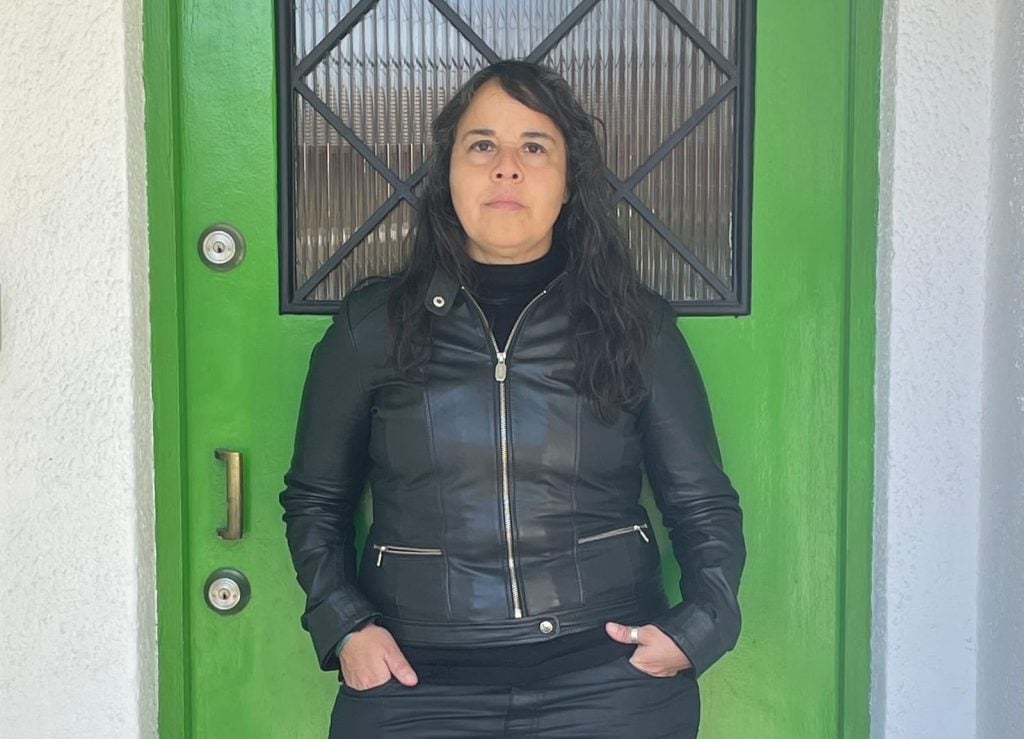By Mariana Hales.-
A novel that traverses Calama, Santiago, and Paris to amplify voices the system prefers to ignore: sex workers, abandoned children, women who have survived violence, and exiles.
With a raw, vivid, and deeply human narrative, Polvo, perros y putas, by Karin Ioannidis, published by Editorial Cuarto Propio, weaves together the stories of people marked by injustice and structural violence, exposing the fractures of a social and legal model that criminalizes poverty and normalizes abuse.
Guided by the voice of Celeste, a sharp, endearing prostitute at death’s door, this story shifts the gaze toward the margins to question the comfort of the center and make space for a memory embodied in forgotten bodies and territories.
Karin Ioannidis, a lawyer by training and a writer by conviction, builds a provocative and necessary work that not only unsettles but also offers a critical reading of so‑called “victimless crimes,” consent amid inequality, and the dehumanization of extractivism in sacrifice zones such as Chile’s far north.
Born in Santiago in 1976, Ioannidis lived in France during her childhood. The daughter of a mother from Copiapó and a father from Crete, her roots are deeply tied to the world’s driest desert and to Mediterranean landscapes. Her legal training and experience in diversity, inclusion, ethics, and social justice enrich her storytelling, reflecting the many fractures of Chilean reality.
Your novel unfolds in settings as different as Calama, Santiago, and Paris. What led you to choose those places, and what do they represent for you?
My mother is from Copiapó and my father from Sitia, a very arid town in Crete, and perhaps for that reason deserts were always spaces of fascination and vulnerability for me. The Atacama Desert is exceptionally extreme in many ways, especially in its wealth and its poverty. That duality captures the essence of the injustice on which Chile’s development has been built.
Both Calama and Tocopilla are sacrifice zones, and that environment—where life is valued less than the riches extracted—makes them ideal places to reveal inequality, the dehumanization of capitalism, and the hardships most people face in their search for dignity.
Meanwhile, Santiago is my hometown, where I have spent almost my entire life, and although the eastern districts project an image of development, the reality is very different in other communes. The novel aims to show those other places that represent the majority of the population and to focus on normalized hegemonic customs such as the cafés con piernas or the existence of supplements like Bomba Cuatro.
Finally, France is, in many ways, the country that shaped me because I lived with my family in Grenoble as a child, studied at a French school, and for a long time the language spoken at home was French—the common tongue between my Chilean mother and Greek father. Although I haven’t lived in Paris, I know the city well, and it seemed like a useful counterpoint to highlight similar issues in the so‑called First World.
Many abuses we’ve normalized are universal, and placing the characters in different parts of the world underscores that the kind of society we’ve built has structural flaws that transcend borders.
The story centers on characters living on the margins: prostitutes, women who’ve endured violence, an exiled lawyer, abandoned children. What political place do these voices occupy in your narrative?
All the themes explored through the different voices share a common thread: injustice. Power and opportunity asymmetries drive the inequity that shapes these characters and forms the backdrop of the entire novel. I’m interested in portraying, in all their dignity, resilience, and vulnerability, people whose lives are crossed by violence and poverty and who, like most of the excluded, lack a voice.
These characters occupy a political place because they question the comfort of the center—what society tends to render invisible, normalize, or discard. By showing it, I try to shift the focus to the margins, opening a space where the excluded are the protagonists and displacing the vantage point from which the world is observed and narrated.
One of the book’s central themes is the notion of “victimless crimes.” Why did you decide to include that debate in a work of fiction?
The decision emerged when the novel was already quite advanced and I realized that every character engaged in one or more behaviors considered victimless crimes in different countries. I felt obliged to address the elephant in the room, which forced me to revisit positions I formed when I wrote my thesis on the subject in 1999. Back then, I believed it wasn’t the State’s role to impose a moral code or punish conduct freely chosen by consenting adults. I thought those actions should be regulated but not prohibited, since prohibition belongs to a paternalistic, oppressive State.
Today my stance, though similar in essence, has changed because there’s a variable I hadn’t considered and that is key to determining whether these behaviors are abusive: power, and more precisely the power asymmetry between those involved.
If we account for our society’s structural inequity, it seems to me that in many of these cases there isn’t a truly free and voluntary decision by those involved; in most instances, these actions result from fear or the absence of opportunities. In such cases, I now see that there are victims—even if they don’t identify as such—and it was important to reflect that in a novel with three prostitutes as protagonists. That said, I want to be clear: this doesn’t justify criminalization, but it does demand proper regulation to prevent abuse.
As a lawyer, what tensions did you experience in narrating stories that the law often prefers to ignore or penalize?
My first experiences as a lawyer were in criminal law, in places with very extreme, neglected realities. I spent a year at the Santiago Penitentiary and then completed my practicum at a center for child victims of crime in southern Santiago. It was at those extremes that my view of the rule of law, marginalization, and extreme inequity took shape.
I remember reading the life stories of people in detention and thinking that, had I lived their lives, I might have acted worse than they did. At the same time, I witnessed the impotence, frustration, and coldness of the judicial system when people who had clearly committed monstrous crimes went unpunished.
At that time, there was the Ciudad del Niño, a center where abandoned children lived, and I had the opportunity to spend time with some who had been abused. The level of neglect and precarity was so extreme that many of them, after my second visit, asked if they could call me “mom.”
In that context, I recall a heated argument with a judge who, in my view, had not properly sentenced a rapist. “All I ask is that when these victims turn up here in a few years as victimizers, you show them the same leniency,” I said before leaving. What I aim to evoke with these stories is that it’s very easy to penalize, to lengthen the list of crimes, or to adopt a tough‑on‑crime discourse, instead of confronting the causes that generate those actions. The root of the vast majority of the crimes so zealously pursued is inequality, deprivation, and abuse.
How does your novel engage with a feminism that demands autonomy over the body and personal decisions, especially in contexts of inequality?
Bodily autonomy is something I promote, and the feminist movement has been key to advancing the equal right of all people to decide freely over their bodies. In that vein, just as I defend a woman’s right to abortion on demand, I support the right to euthanasia and the decriminalization of conduct associated with assisting in those decisions.
However, when we confront pornography, incest, and prostitution, the easy reading would be: as an adult, I do what I want with my body. In these cases, the analysis is much more complex, and two key elements must be considered: power asymmetry and the lack of opportunities. Those are the decisive factors in assessing whether the use of the body is a tool of power or an object of abuse.
The book contains a clear critique of the abandonment of Chile’s far north. What was your intention in portraying that reality?
Chile’s far north is a protagonist in this novel, allowing us to portray marginalization amid extreme landscapes and climate, and it also symbolizes sacrifice zones and the harshness of life in inhospitable places. Eduardo, one of the protagonists, travels through different deserts during his exile and finds a common thread in all of them: the identity of those who have never known abundance. That can be extrapolated to many latitudes.
In essence, Calama and Tocopilla are sacrifice zones where production and resource extraction have been prioritized over the quality of life of the people who live there, and that reality exists in other parts of the country and the world, giving the theme a universality beyond the local.
You’ve said that the voice of Celeste, a prostitute who narrates part of the story, guided you during the writing process. What does Celeste represent in this narrative universe?
Although, in my view, she is the most rebellious of all the characters, Celeste is the only one who seems not to fight against the reality she has been dealt. That apparent resignation is actually a sign of profound dignity and wisdom. She navigates the limits of her life without submitting, and her sense of humor gives the novel oxygen as it addresses themes that are complex and difficult to tell.
Celeste embodies the right values and, in more existential terms, she is the child in Nietzsche’s Thus Spoke Zarathustra: innocence, the ability to forget, to create, to play, and to give meaning to life under any circumstance.
Do you feel that contemporary Chilean literature is addressing with sufficient force topics such as prostitution, inequality, or the effects of extractivism?
There are writers I admire who have addressed many of these issues with strength and depth. Diamela Eltit has been a trailblazer in exposing the body as a mechanism of resistance to repression and abuses of authority, as well as in writing about prostitution, the exploitation of bodies, and structural violence. Nona Fernández has been essential in bringing to light the precarity of lives on the margins within a framework of political memory. Lina Meruane and Alia Trabucco Zerán are also key references who, in various works, have exposed gender inequalities in a patriarchal system.
However, when I hear libertarian‑liberal rhetoric and see the growth of denialism, I think we must continue to address the issues at their origin. In that sense, it’s crucial to talk more about inequality, memory, and the effects of consumerism and extreme capitalism—the very causes of extractivism.
Finally, what has it been like to publish a debut novel that unsettles, provokes, and questions?
I feel very fortunate that the novel is gaining traction and can put fundamental issues on the table. It’s especially important to discuss these ideas at a time when human rights seem to be trivialized and most political discourse centers on growth and economic exploitation. If this work unsettles, provokes, or questions, that means it’s all the more necessary.

Interview by Mariana Hales.-



